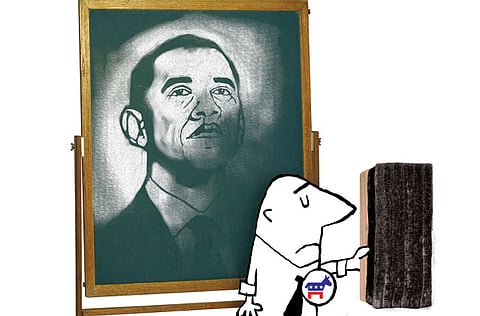Obama, the Democratic base and Al Awlaki's killing
The Al Qaida mastermind's assassination gives credence to the fact that not much has changed since the Bush era

The death last week of Anwar Al Awlaki offered the rarest of sights in American politics: bipartisanship. Figures from both left and right questioned the killing, which the US has not formally claimed credit for but is universally assumed to have carried out.
To be sure, most Americans who gave the matter any thought were probably pleased with the news. Awlaki may have lacked the Bond-villain mystique of Osama Bin Laden, but for the last two years or so he has been presented as a uniquely menacing figure: a child of immigrants, born and raised in the United States, who later turned against the country.
Few Americans were sorry to learn of his demise. The presumed manner of it, however, was another matter. Right wing activists, including presidential candidate Ron Paul, criticised the extra-judicial nature of the killing. Doesn't it set a pretty dangerous precedent, Paul asked, when the president can order the death of a US citizen on foreign soil without any sort of judicial hearing or review?
It does. And on this, the American left finds rare common ground with the American right. For progressives, however, the circumstances of Awlaki's death point to a deeper problem, one that Barack Obama must resolve if he hopes to win re-election 13 months from now.
For many activist Democrats, Obama's failure to dismantle the legal edifice of George W. Bush's ‘War on Terror' remains, nearly three years into his term, the president's Original Sin. On his first day in office, Obama pledged to close the Guantanamo Bay prison camp. He then failed to deliver. One can argue that blame for this lies mainly with fear-mongers in Congress, but it is also difficult to avoid the conclusion that when confronted with that opposition Obama did not push very hard.
Similarly, saying it was important to move forward rather than look back, the new president insisted that there be no ‘truth commission' to examine the abuses of the Bush years. Many Obama supporters agreed, albeit a bit grudgingly, but few anticipated that this would also involve quietly leaving in place most of the dubiously-legal national security state that Bush spent much of his presidency building.
Of course, Obama was always bound to disappoint his most ardent supporters. A skilled campaigner, he allowed many Democrats in 2008 to believe him more of a passionate liberal than he really is. The right-wing's hysterical cries of "socialism" notwithstanding, he has governed as an even-tempered, at times bloodless, centrist.
As he moves back into campaign mode, it is difficult to figure out what he believes will constitute a winning strategy. The conventional wisdom of American politics says that presidents win re-election by locking down the support of their base and then moving to the centre.
Obama seems, at the moment, to be heeding this advice. His early campaign swings have sought to re-capture the fervour of his 2008 campaign and are clearly designed to charge up the Democratic base. Foreign policy is not a big part of this.
Obama's efforts to excite his core supporters are focused mainly on taxes, job creation and protecting his wide-ranging health-care reforms. Events like last week's drone strike in Yemen, however, offer a regular reminder to the Democratic faithful that when it comes to foreign policy the differences between the present administration and its predecessor are often more style than substance.
Deeper dissatisfaction
Add this to a deeper dissatisfaction among American liberals with Obama's unwillingness to fight the Republicans there is the potential for serious political trouble. Many liberals feel betrayed, and while no one is seriously considering a challenge to Obama from within his own party one gets, among Democrats, a gloomy vibe: a feeling that Obama's best hope for re-election lies in the Republicans nominating an unelectable crackpot to run against him. That could, of course, happen; but it is not something one wants to bank on.
The National Security State probably will not be an issue in next year's campaign, but it has become one within Obama's base. In this respect, killing Anwar Al Awlaki may have removed a terrorist thorn from America's side, but it also reminded many of Obama's supporters of the things about his administration that have most disappointed them.
To be clear, American liberals are all for going after terrorists. But the difference between Obama and Bush was supposed to be that an Obama administration would do so within recognised legal norms, and in ways that accord with American values. If the White House cannot explain to liberals why so little seems to have changed, it may have trouble convincing those same liberals to give money, knock on doors and man phone banks as Election Day approaches.
Gordon Robison teaches political science at the University of Vermont.
Sign up for the Daily Briefing
Get the latest news and updates straight to your inbox



